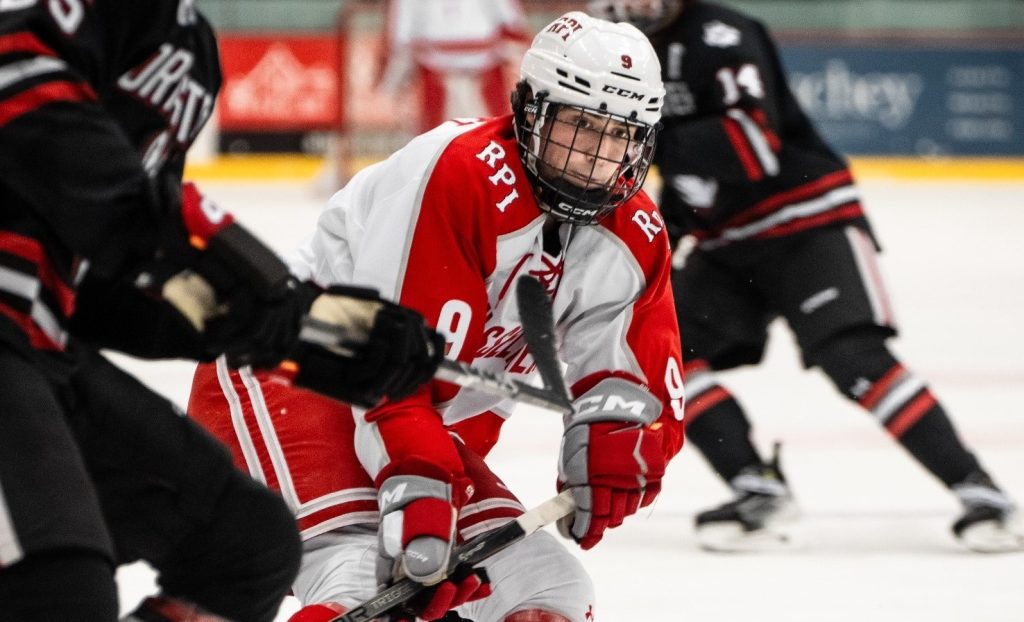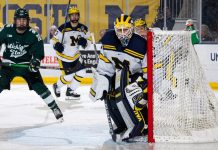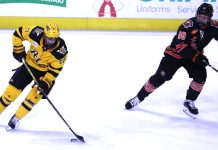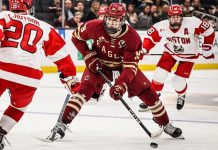
The holiday season is a relatively dead period in the hockey world, but it felt exceptionally low-key this past week when Buffalo Sabres head coach Don Granato missed a pair of games with an undisclosed illness.
It wasn’t contagious per his own admission in the interim period after the team’s loss to Boston, but a hoarse, lost voice forced him to step aside for a pair of home games at the KeyBank Center, the first of which was a Saturday night overtime win over Columbus.
In his place stepped Seth Appert, the head coach of the AHL’s Rochester Americans and a name easily recognized as the former head coach of Rensselaer’s men’s hockey program. His hockey odyssey had included an 11-year stint with the Engineers, but the former head coach of USA Hockey’s Under-18 team with the United States National Team Development Program made him acutely qualified to pinch hit with one of the youngest rosters in the NHL – as well as one built from minor league prospects he once developed.
His multi-game odyssey made for good headlines, but even if Granato returns for Buffalo’s game at Montreal on Thursday, Appert’s name is likely entrenched as a coach capable of developing pro-level talent. In many ways, it’s a continuation of a similar story occurring at his old stomping grounds where successor Dave Smith is in the process of building a program that’s better than most people realize.
The numbers don’t break kindly against RPI’s surface, but a scoring defense ranked near the bottom of Division I is largely skewed by opponents capitalizing on individual stretches of hockey. Two goals in 30 seconds, for example, helped Boston College push a 2-1 lead to a 4-1 lead before another stretch of two-minute hockey in the third period bloated an otherwise-even game.
The next night’s game against Providence was a similar story where two short-handed goals helped the Friars negate a 2-0 first period deficit before an empty-net goal gave them a 4-2 overall victory.
The easy-to-target story from those games is that bad teams find ways to lose games, but RPI beat Union’s six-goal outburst with an 8-6 final on road ice before scoring three unanswered goals in a 4-2 win over Clarkson. Even the 9-2 loss to Northeastern – as bad as that looked – followed a 3-3 tie that required a shootout for the Huskies to earn the win, and a recent, 1-0 loss to New Hampshire featured a team starting to gel after having its positive outlook tested through much of the first half.
“Boston College was a 2-1 game before they scored two goals on back-to-back shifts,” said Smith. “We played fine in that game, but you can’t play fine against a really good hockey team. Providence, we knew it was tough, and we gave up an empty net goal and two short-handed goals. But that’s a tough schedule, and we come back and split with Union. Even looking at the schedule, we beat Clarkson where we played well and won, but the next night hurt us.
“Northeastern is a better team than their record indicated, and the second game just got away from us. But then we play well against Princeton and lose, and at that point, our confidence was really being tested. The schedule starts to get noticed where [you can ask] what could have happened if we split the North Country tip with Clarkson and St. Lawrence, but the weight of those losses really took a toll because we saw a crooked number in the loss column while we didn’t think we were playing awful.”
The first half of the season felt snake-bitten, but Smith and his coaching staff kept reinforcing that evident progress existed within those losses. Scoring hadn’t been the issue, and the number of goals allowed dropped in the last five games before New Year’s Eve. The number of shots allowed likewise began dropping, and the correlation between penalties taken and power play goals scored began evening out. A team that averaged 14 penalty minutes per game in the first half of the year halved the number of the last month, and a power play unit that struggled at the start of the year began clicking for a quarter-plus of its chances to elevate its percentage over 16 percent.
“We really tried to show them how progress was being made,” Smith said. “It’s hard, but I thought we were breaking the puck out very well, and we had been excellent in transition. Then we started generating more offensive opportunities. When we had a week off after Clarkson and St. Lawrence, we changed a couple of things, and then we had another week off after Quinnipiac and Princeton. That’s when we realized that our guys were practicing hard. They were still really focused on trying to be their best, and while the confidence wasn’t high, those two weeks off of games gave us a chance to really show them.”
Time is usually what in-season teams don’t possess, but holding RPI stock paid its first dividend when goalie Brett Miller stopped 29 shots behind a defense that blocked 13 shots in the 1-0 loss to UNH. Six days later, a 4-3 win over Minnesota State saw the aforementioned power play score twice before Jakob Lee notched an overtime game-winner, and the return of goalie Jack Watson anchored a three-goal, third-period burst against Canisius that included two goals in 90 seconds – one night before a low-scoring, 2-1 win on the road that featured another 14 blocked shots.
“We talked about commitment and committing to a play,” Smith said. “Blocked shots also mean that you’re spending too much time in your defensive zone, which we’re aware of, but it speaks to the commitment of guys going to do whatever it takes to help us keep the puck out of the net. The beginning of the year was a tough stretch, but our guys remained committed – and this is what we’ve seen from them all year.”
ECAC is more wide-open than ever, and there’s good reason to believe RPI has enough spunk to make a run as the league’s overall dark horse. The next four games are both at home, and the second half begins with Brown and Yale, two teams that are in or around the bottom four of the standings. One good weekend would lift the Engineers straight into home ice, and two consecutive streaks – including next week’s St. Lawrence-Clarkson series at home – opens the door to an immediate run at fourth place before trips to New England at the end of January and beginning of February.
“Everything is a link in the chain,” said Smith. “The power play is a link, the penalty kill’s a link, goaltending is a link, and if something is not as strong as the other area, it takes a shot at the whole team. When we were losing games, the power play wasn’t very good, and the penalty kill wasn’t very good. Goaltending was a piece of that, but we got really good goaltending [from Carson Cherepak] in the Clarkson game and in the first Northeastern game. Getting Jack Wagner back [against Canisius] just gives the team a little bit more confidence. He’s got our back, and Brett Miller has stepped in for us at times and played really well.
“It’s all just helping us to strengthen some other links and take steps forward.”


